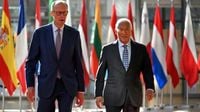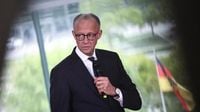On May 9, 2025, during a visit to Brussels, German Chancellor Friedrich Merz (CDU) confirmed that the government has not declared a state of emergency regarding irregular migration. Merz acknowledged that there had been some "irritations" concerning the issue, but emphasized that no "Notlage" (state of emergency) had been declared. He stated that border controls in Germany would be intensified and that the country would continue to turn back asylum seekers, all in accordance with European law.
This clarification came in response to a report from Die Welt on May 8, which suggested that Merz intended to declare a national emergency as part of his migration policy. A spokesperson for the Bundespresseamt quickly denied this claim, stating, "Wir rufen keinen nationalen Notstand, wie es richtig heißen würde, aus" (We are not declaring a national emergency, as it should be called).
On May 7, 2025, Interior Minister Alexander Dobrindt (CSU) announced tightened border controls aimed at reducing the number of refugees entering Germany. This plan includes deploying more federal police officers at the borders and allowing the return of asylum seekers. The government is currently informing the ambassadors of neighboring countries about these changes.
Dobrindt cited Article 72 of the Treaty on the Functioning of the European Union as the legal basis for the tightened border rules, which permits deviations from EU law for the "Aufrechterhaltung der öffentlichen Ordnung und den Schutz der inneren Sicherheit" (maintenance of public order and protection of internal security). However, it is important to note that the term "Notstand" (state of emergency) does not appear in Article 72.
During his statements in Brussels, Merz compared the current border control measures to those implemented during the European Football Championship last year. He reassured attendees that there would be "keinen deutschen Alleingang" (no German go-it-alone approach) regarding the return of asylum seekers, and that neighboring states would be "vollumfänglich informiert" (fully informed).
The discussion around the declaration of a national emergency arose due to Dobrindt's announcement of returns at the borders, which sparked protests from neighboring countries, including Poland and Switzerland. Critics, including members of the opposition, have accused the new government of creating chaos in migration policy. Christian Dürr, a member of the FDP, criticized the government's inconsistent messaging, saying, "Erst vollständige Zurückweisungen und dann doch wieder nicht. Das ist eine Katastrophe" (First complete returns and then not again. This is a disaster).
In a related development, Polish Prime Minister Donald Tusk expressed irritation over Germany's migration plans during Merz's visit to Warsaw. Tusk stated, "Deutschland wird in sein Gebiet lassen, wen es will. Polen wird nur in sein Gebiet lassen, wen es akzeptiert" (Germany will let in whom it wants. Poland will only let in whom it accepts), emphasizing that Poland would not accept being pressured into taking in migrants based on Germany's policies.
Merz's government is also facing scrutiny over its approach to migration and border controls. Critics argue that the proposed measures may not align with EU law and could threaten the principle of free movement within the Schengen Area. EU Commission President Ursula von der Leyen stated that border controls at EU internal borders are only permissible temporarily and must be coordinated with both Brussels and the respective states.
In response to the tightening of border controls, the Austrian government has expressed support for Germany's efforts to combat human trafficking and illegal migration, while also insisting on compliance with EU law. Interior Minister Gerhard Karner (ÖVP) stated, "Österreich begrüßt generell die Bestrebungen Deutschlands im Kampf gegen die Schleppermafia und illegale Migration" (Austria generally welcomes Germany's efforts in the fight against the smuggling mafia and illegal migration).
As the Merz administration navigates these complex issues, it is clear that the migration policy will be a focal point of both domestic and international scrutiny. The government's commitment to engaging with neighboring countries and ensuring compliance with EU regulations will be crucial in shaping the future of Germany's migration landscape.
In the coming weeks, Merz is expected to hold discussions with US President Donald Trump regarding various issues, including the Ukraine war and tariffs. This call, scheduled for May 8, is anticipated to enhance diplomatic relations between the two nations.
As the new Chancellor, Friedrich Merz aims to balance domestic concerns over migration with the need for cooperation and unity within Europe. His administration's approach will likely continue to evolve as it responds to both internal pressures and external expectations.



